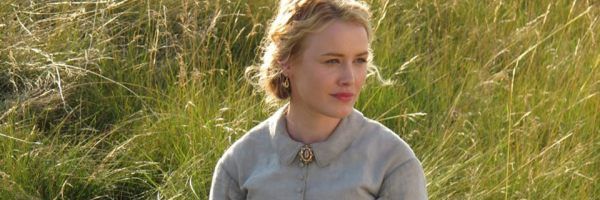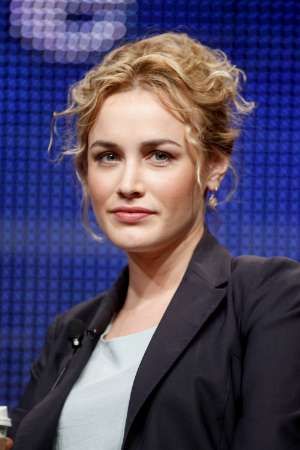On the new AMC Western series Hell on Wheels, Irish actress Dominique McElligott plays Lily Bell, a newly widowed woman trying to survive in a man’s world. After the death of her husband, Lily has the desire to fulfill her husband’s dream, which ultimately becomes her own dream, as she slowly gains respect in a world where even the toughest of men would fail.
During this exclusive interview with Collider, Dominique McElligott talked about doing her first American television series, how the authenticity and complexity of Hell on Wheels really appealed to her, that she loves playing the strong outsider on an emotional journey, that the average lifespan for the real women who arrived in Hell on Wheels (what they called the traveling town that serviced the construction of the first transcontinental railroad) was only 17 months, and how the challenge of working out in the elements while weighted down by the costumes and covered with mosquito bites only adds to her performance. Check out what she had to say after the jump:
Question: How did you come to this show? Were you looking to do American television?
DOMINIQUE McELLIGOTT: I hadn’t done any work in America. I’m from Ireland. It was very serendipitous. Ironically enough, I was doing a Western in Bolivia, and my manager, who was an American woman that I met in London, was bugging me to come over to L.A. and I didn’t want to. I was hanging out in London, just back from this Western I did in Bolivia, and I was having drinks with friends who are all flight attendants, and they said that they would get me over to America for free, and I could stay and do some meetings and auditions. Hell on Wheels was the first one. I arrived on the 5th of July, and the Hell on Wheels audition was on the 6th or the 7th. It was crazy! They didn’t know me, at all.
Obviously, I loved the pilot and I loved the character, but I didn’t anticipate ever actually getting the chance to do it. When you go up for these brilliant parts, you just figure, “Okay, well, they’re going to pick some American actress, and that will be that.” But, the opportunity was there, and I really enjoyed the audition. It was fun. Actually, I did do an American pilot, but it wasn’t shot in America, it was shot in South Africa. It was called The Philanthropist, and it was for NBC. But, my character was cut out of it. One of the writing producers didn’t see a future for my character, so it was bye-bye me, and I packed my suitcases and went home. It’s always touch-and-go. You never know what’s going to happen to a show. We just had a lot of wishes and hopes that this would turn out because we’re very fond of it.
What do you think makes this Western different from Deadwood?
I know that comparisons are being made between Deadwood and Hell on Wheels, and having watched Deadwood, I think that the comparisons are going to stop, after a couple of episodes, and the show is going to be seen to be so much more than a Western. It’s so much more than that. You don’t get the diversity of characters in a Western that you get in this show. The authenticity of it, and the fact that it’s not stylized like the Westerns are, makes it much more complex. There are social issues being dealt with. There is such a diversity of characters that you wonder, “How are these people going to relate to each other? How are they going to converse?” There’s going to be conflict. There’s going to be a lot of tension. How is that going to be resolved? What’s the interaction like? Basically, it’s a question of survival, and who’s going to survive and who’s going to die. It’s so much more than just a Western.
What was it about this woman that you felt you could identify with?
McELLIGOTT: I love that she’s an outsider. I love that she’s from this alien place, in comparison to where she ends up, in Hell on Wheels. She is bridging the gap between these two worlds that are so different from each other. She’s lost, and she’s trying to find out where she belongs, and form a place for herself. I really love that, and I love her strength. I like playing strong characters, where there’s somewhere to go. She has a lot to work with. The emotional magnitude of it is just enormous. When I was doing some of Lily’s scenes, more so than any other shoot or character, because of the elements and the grittiness and the authenticity of the show, I found it so draining, emotionally, physically and mentally. I would go home with 42 mosquito bites, just weighed down by 100 pounds of clothes and corseted. It’s just crazy, how these women survived. Well, they didn’t. I read that the average lifespan for a woman, when she arrived at Hell on Wheels, was 17 months. That’s how long they lasted. They would die because of the elements and all the things they had to cope with. That gives you an idea of how gritty it was. To go there emotionally is quite a challenge.
How does the pain and suffering that Lily goes through in the pilot affect who she is, for the rest of the series?
McELLIGOTT: She certainly goes on a journey. You’ll see. It jumps back. You don’t see much of her history and background in the pilot. She’s the Englishwoman, and you’re speculating that she’s not from there and that she’s out on her own with her husband, but it will go back and you’ll be given a flavor of where she is and what she decides. The pain and suffering that she goes through is the beginning of her developing a stoicism, in terms of what she’s used to and what she has to deal with. She becomes immune to it, to a certain extent. In a lot of ways, she’s the audience, who acts as the introduction to this world because she also is the outsider. I really like that. That’s her job, and you get to see her survive, under those circumstances.
Does she have much interaction with the other characters, throughout the season?
McELLIGOTT: She does, absolutely. She is feisty and fiery. She doesn’t make friends too easily. That’s the same with all the characters. Elam (Common) and Cullen’s (Anson Mount) story is a fantastic storyline, with how they relate to each other and how they develop a rapport. Lily will interact with everybody, and some relationships are good and some are bad.
Once you were cast, did you do any research into this time period, or does being in the environment with the sets and the wardrobe help?
McELLIGOTT: Both are a help. The costumes absolutely help. You go straight there, when you put on 100 pounds of clothing. I also watched a documentary that I was given about the transcontinental railroad and the building of it. I asked the brothers (Joe and Tony Gayton) a lot of questions. They’re very knowledgeable. They worked on the pilot for three years, so they knew everything and they were able to tell me a lot of stuff. The more I stayed with it, the more interested I got. It was really fascinating. The whole industry of it and just the work that went into it and the people that surrounded the building of it was absolutely fascinating.
Has it been a collaborative process, in developing this character?
McELLIGOTT: They were 100% responsible for Lily. They’re fantastic, talented, gifted writers. I love it. I don’t know how they do it, but they wrote the character. I cannot take credit for Lily. I can take credit for the performance, but they’re the writers. If I have freedom to experiment with a scene, then I try my best to do that. With TV and with the variety of directors you have on a season, you rarely get that opportunity. It’s more structured.
What’s it been like to shoot this in Calgary, Canada?
McELLIGOTT: I miss L.A. because of the weather. It can change so much in Calgary. You can get a storm one minute, and then the sun will come out and it will be hot. We’ll have wet suits on under our clothes when it’s raining, and then we have to go bare-legged when the sun comes up because we’re so hot. That can happen in the space of a day, in just a couple of hours.
Does being that far away from home help you, in terms of the character?
McELLIGOTT: It is a help, in one regard, but it’s also a distraction, in another regard. If you’re so hot that you can’t concentrate, or you’re getting bitten by mosquitos in the middle of a scene and you just want to scratch, that can be distracting, but you’ve got to roll with it. It’s that type of show. If it adds to the authenticity and the look and the grittiness of what the show should be, then I’m happy. Anything for the art, right?
What has this cast been like to work with?
McELLIGOTT: Everyone is great, and really super-talented. Anson [Mount], Colm [Meaney] and Robin McLeavy are wonderful actors. We’re just so lucky. They’re very focused and passionate. The characters are so well-developed and multi-faceted that it just makes our job so easy. I haven’t really had that many scenes with Common yet, so I hope I have a chance to do more with him. He has a fantastic character and storyline, and he’s a wonderful actor and guy.
As an actor, is it fun for you to explore a character over a longer period of time, with different directors, who all have their own vision?
McELLIGOTT: It depends. Each director has their own style, so it’s a compromise, in terms of what your vision for a character is and their vision for the scene. You meet half-way and just find some common ground. Every director is different, but the insights from new people on set give you a different opinion and perspective, which is always embraced, in some way.
What’s been the most fun thing about exploring this character and being a part of this show, and what has been the most challenging aspect of it?
McELLIGOTT: The elements have been the most challenging, and just having to work in them. We’re in studio maybe two days for each episode. Just being outside, filming on a reservation, is the most challenging. The most fun part for an actor is the writing and the story and the character. That’s very fulfilling. Outside of that, the people that are on the show are just a joy and a pleasure to work with because everyone is so passionate and enthusiastic.
What initially attracted you to acting? Was it something you always knew you wanted to do?
McELLIGOTT: Yeah, from a very young age. I distinctly remember watching Daniel Day Lewis in My Left Foot, and my parents were discussing the fact that he’s an actor. To me, it was a foreign concept. I was like, “Someone is pretending to do that? That’s so awesome!” After that, it just stayed in the back of my mind. I started doing drama after school, and it just developed into something that I did and I enjoyed, very much.


